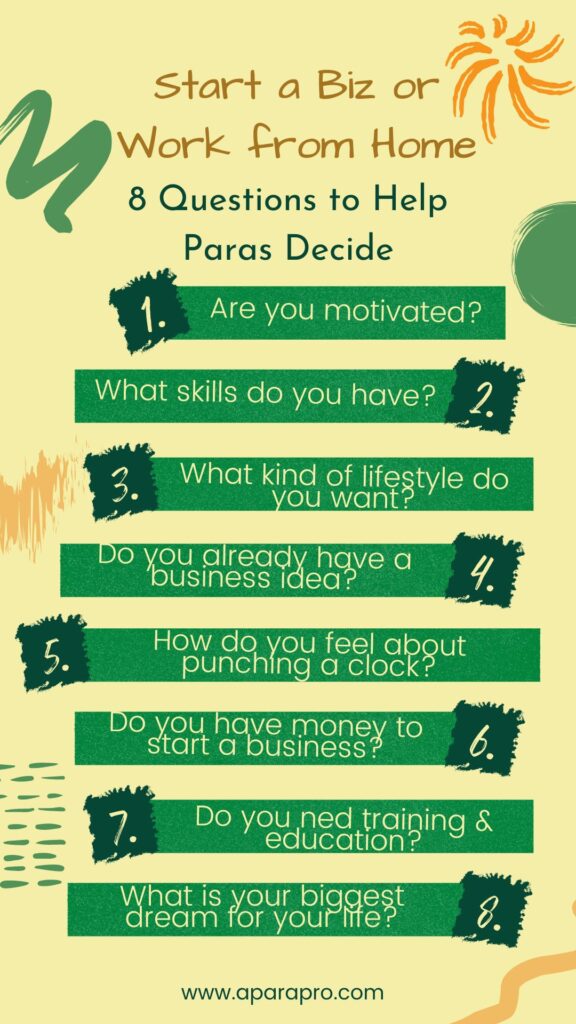Home Business or Work-at-Home Job – Which Is Best for Paras?
As a paraeducator, you know that your job can be both challenging and rewarding. You also know that your wage may not be as high as you would like it to be. You understand that every little bit helps when it comes to supplementing your pay. But what's the best way to go about it? Should you start a home business, or look for a work-at-home job? Which is best for you?
There's no easy answer, but in this blog post, we'll explore closely the pros and cons of both options, to help you make the best decision for your situation.
8 Questions to Help Paras Decide Between a Home Business or Work-at-Home Job
The best choice for you will depend on your unique circumstances. Here's a look at some of the factors to consider when making your decision.

1. Are You Self-Motivated?
If you want your own business so that you can set your own hours, you will need to be very self-motivated. You'll need to take time out of your day for marketing, interviewing clients, closing the deal, and then doing the work too. Plus, you'll be 100 percent responsible for delivering the work, billing, and collecting. You'll even be responsible for deciding the methods you'll use to do the work. To do that you'll need to be a very self-motivated individual.
Working for yourself can be a great way to supplement your income as a paraeducator. It can be a great way to get some extra money to help pay the bills or save up for a special purchase. But it's not for everyone. You have to be very self-motivated to be successful.
There are a lot of things to consider when you're thinking about starting your own business. But if you're self-motivated and willing to work hard, it can be a great way to earn some extra money.
2. What Skills Do You Have?
You may not think you have any special skills, but chances are you have more skills than you realize. Take a piece of paper and write down a list of the skills you currently have, based on what you’ve already done in the past. Can any of these translate into a business? Label them appropriately. Do any of these translate into common work-from-home positions such as call center agent or transcriptionist? Some skills cross over into both, but which side of the list gets full faster?
If you’re a paraeducator, you likely have a wide range of skills that can be transferred to other professions. Many of the skills you use on a daily basis can be adapted to other settings and used in a variety of ways. For example, your organizational skills can be used to create a system for file management at a small business or to help a friend get their home office in order. Your patience and ability to multitask can be leveraged as a call center agent or a transcriptionist. And your knowledge of individualized education plans (IEPs) and other special education processes can be used to consult with parents or to train new staff members.
The sky’s the limit when it comes to finding new ways to use your skills. So take a closer look at the skills you already have and think about how you can put them to work in new and exciting ways.

3. What Sort of Lifestyle Do You Want?
When it comes to deciding what sort of lifestyle you want, it's important to think about what you're willing to sacrifice in order to achieve it. For example, if you want the freedom to work from home, you may have to give up some of the stability that comes with a traditional job. With a work-at-home job, you'll be required to “show up” for work on time each day that you're scheduled, and you may have little control over that schedule. What's more, with work-at-home positions it's a lot harder than in typical jobs to call in sick, whether it's you or a child who is sick. Often the first 90 days you cannot miss your schedule at all if you want to keep the position.
Are you ready for that? Or, would you prefer a more family-oriented type of schedule that can be adjusted more easily and is more deliverables-based than hourly-based?
It's also important to think about the lifestyle you want in terms of location. Do you want to be able to travel and work from anywhere in the world? Or, would you prefer to have a more traditional office job in a specific city?
There are pros and cons to both types of lifestyles, so it's important to really think about what you want and what you're willing to sacrifice in order to achieve it. Once you know what you want, you can start to look for jobs that will help you achieve that lifestyle.
4. Do You Already Have a Business Idea?
If you have already researched a business idea, and feel as if you want to do that instead of working for someone else, can you pull it off? What steps do you need to take to make it a reality? Are you the type of person to be able to organize and take the steps needed to get your business off the ground? Can you find and afford help if you’re not sure what to do to get the business going? Does the thought of all this stress you out?
There’s no shame in admitting that the thought of starting your own business is daunting. It’s a huge undertaking and one that comes with a lot of risks. But if you’ve done your research and you’re confident in your ability to make your business a success, then it’s time to take the plunge.

The first step is to come up with a business plan.
This document will outline your business goals, strategies, and how you plan on achieving them. It’s important to be as detailed as possible so that you can reference it later and make sure you’re on track.
Next, you need to figure out the financial side of things.
How much money do you need to get started? How will you generate revenue? What are your operating costs? Knowing the answers to these questions will help you determine whether or not your business is viable.
Once you have a business plan and a financial plan in place, it’s time to start putting your plan into action.
This is where things can get a little overwhelming, but it’s important to remember that you don’t have to do everything at once. Take things one step at a time, and focus on the task at hand.
If you need help getting your business off the ground, there are plenty of resources available to you. There are business incubators and accelerators, which can give you the structure and mentorship you need to get started. There are also a number of online programs that can teach you the ropes.
Starting your own business is a huge commitment, but it’s one that can be incredibly rewarding. If you’re ready to take the plunge, then it’s time to get started.
5. How Do You Feel about Punching a Clock?
It's no secret that working a 9-to-5 job can be pretty mundane. For some people, the idea of clock punching is relaxing. It can be nice to have someone else tell you when to be somewhere and what to do. You don't have to worry about the little details of life, like what to make for dinner or whether you turned the lights off before you left the house.
But for others, the idea of punching a clock can be a nightmare. It can feel like you're in a prison, with someone else dictating your every move. If you're the type of person who likes to be in control of your own destiny, a 9-to-5 job is probably not the best fit for you.
So, how do you feel about punching a clock? There's no right or wrong answer, as it takes all types of people to make this world work. If you know upfront that you're fine with clock-punching, and you'd rather someone else tell you when to be someplace and what to do, then a work-at-home job is probably best for you. But if the idea of a 9-to-5 job feels like a prison to you, then a business is probably a better fit if you can do what it takes to get it going.

6. Do You Have Money to Start a Business?
Do you have money to start a business? Starting any type of business, even an online business, requires an investment not only in time but also in money. Have you worked out a business plan and do you know how much money you need to get started? Do you have that money available? If not, do you have a way to get it? Perhaps working at a job first, while you save for and work on your business on the side, is the way to go if you don’t have the funds to start.
If you're a paraeducator who wants to supplement your pay, starting your own business may be a great option. But before you take the plunge, it's important to have a solid plan in place—and that includes knowing how much money you'll need to get started.
Do some research to find out the start-up costs for businesses similar to the one you're interested in starting. Then, create a budget and see if you have the funds available to cover the costs. If not, you may need to explore other options, such as working a full-time job while you save up for your business or looking for investors to help you get started.
Whatever you do, don't let a lack of funds stop you from pursuing your dreams. With a little planning and determination, you can find a way to make your business a reality.
7. Do You Need Training and Education?
If you're thinking about supplementing your income or getting your business off the ground, you may be wondering if you need formal training or education. The answer is maybe. It depends on your goals and what you're comfortable with.
There are plenty of jobs that will train you from the ground up, even if you have little experience. The pay may be low, but you'll gain the skills you need to eventually move up in the company or start your own business.
On the other hand, if you're looking to get your business off the ground quickly, you may want to invest in the training yourself. This way, you can learn at your own pace and tailor the education to your specific needs.
There's no wrong answer here. It's simply a matter of what's best for you and your goals. Whichever route you choose, don't be afraid to ask for help along the way. There are plenty of people who are willing to mentor and support you on your journey.

8. What Is Your Biggest Dream for Your Life?
When you think of the future, what do you see? For most people, the future is a time of hope and possibility. We all have dreams and aspirations for what we want to achieve in life. And while our specific goals may vary, there is one common thread that unites us all: the desire to be happy and fulfilled.
So what is your biggest dream for your life? What do you want to achieve?
For some people, their biggest dream is to have a stable job with a good income. They want to be able to support themselves and their family and have a comfortable life.
For others, their dream is to be their own boss and have the freedom to work whenever and wherever they want. They want to be in control of their own destiny and make a difference in the world.
Whatever your dream is, it is important to remember that it is within your reach. With hard work and determination, you can achieve anything you set your mind to.
In the End
Whatever you decide, neither is right nor wrong. They are both good choices for you. Whether you want a work-at-home job so you can sign off after the day and focus 100 percent on your family, or whether you want a business that will cross boundaries into family time and vice versa but that puts you 100 percent in charge – both are good choices and choices that you are fortunate to have in this age of high-speed internet. You are fortunate to have these choices available to you, and whichever you choose, you will be making a good decision. So take your time, consider your options, and make the choice that is right for you and your family. Let me know in the comments below which you'll choose.






